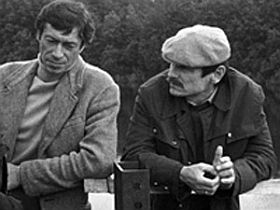


Igor Mayboroda: Rerberg and Tarkovsky

140 minutes with the subtitle ”The Reverse Side of ”Stalker””. Watched in one shot, you feel exhausted afterwards, and more than happy having experienced the company of Russian artists at their best in a drama put together in a demanding way (lots of subtitles to read for a non-Russian speaking person) with unique archive material, sound interviews, picture interviews, clips from films, film historical comments, intrigues and an insight to the work of the cameraman Gregori Rerberg (1937-1999), the main character of this film, a brilliant speaker about his profession and inspiration sources. Mayboroda’s documentary and documentation of the relationship between Andrei Tarkovsky (1932-86) and Rerberg is unique both in terms of film history and as a story of what actually happened, when Tarkovsky sacked Rerberg as cameraman in ”Stalker” (1979). Until now the primary source was Tarkovsky’s memoirs, Mayboroda brings new knowledge to the sad story.
Here is – taken from the voice-off subtitle texts in the beginning of the film – an edited summary of the conflict: ”The Mirror” (1974) was the peak for both Rerberg and Tarkovsky. Rerberg saved Tarkovsky when he agreed to shoot the film because everybody else refused to do it. Tarkovsky also shot his next film ”Stalker” with Rerberg… during the shooting of ”Stalker” Tarkovsky lost mental and emotional control leading to a collapse of human relations in the film crew. This catastrophe anticipated the collapse of the Soviet Union. The humanist film director Tarkovsky omitted Rerberg from the credits of ”Stalker” in the tradition of Stalin’s era, depriving him of a well-deserved future in the profession. However, it was Rerberg, who guided Tarkovsky back to his proper path during the shooting of ”Stalker”.
Strong words and accusations which are supported by interviews with many colleagues, who – many of them – also were sacked by Tarkovsky, who shot ”Stalker” three times keeping – as it is said by many – the camera style of Rerberg in the final version. The material shot by Rerberg went up in fire so that can not be directly verified.
Many reasons are given for the sacking of Rerberg, and others, from the mouth of Tarkovsky. In a section of the film called ”Italian Dialogues”, Tarkovsky says that Rerberg behaved badly, drank all the time, and delivered material, that was out of focus! The conflict, and Mayboroda’s paying Rerberg justice, takes up a lot of the film’s duration, with many pointing at Larisa, the wife of Tarkovsky, as the intriguing person, who wanted to have big roles in
her husband’s films but were denied so, very much because of Rerberg’s evaluation of her (lacking) talent. But having said so, the film is also a tribute to the art of cinema, and in some sequences itself pure beauty.
Because what Tarkovsky also said about Rerberg was that his images were always “an aspiration for the truth, the truth presupposed by all his previous experience”. Beautiful! And during the whole film, through the archive material with him, Rerberg always praises Tarkovsky. He says that two people have meant most for him, Tarkovsky and the conducter Mravinsky (1903-1988) with whom, Rerberg filmed a documentary. In an excellent montage Mayboroda lets the music from this film and clips from Mravinsky conducting or talking about his métier comment the work and philosophy of Rerberg. It works perfectly and supports the words of Rerberg (about Tarkovsky and himself making ”The Mirror”) – the autobiographical films are those that work best, we reached the subconscious in that film, we succeeded to let ”the inner come out”. Another inspiration for Rerberg was the philosopher Losev (1893-1988) – Viktor Kossakovsky tells how he got Rerberg to do the camera for his student film about Losev, and was so enthusiastic about listening to the philosopher that he forgot to start the camera.
Rerberg himself refers constantly to the influence he got from paintings – he liked them all, from renaissance to Russian avant-garde, except for expressionism, ”I’ve learned from painting my whole life”. His family background was one of music and literature, which the film also describes in a fine way.
A Shakespearean story. Film history. A tribute to film art. Amazing, and of course it makes you want to go back to Tarkovsky again!
Photo: Rerberg (left) and Tarkovsky.
Russia, 2009, 140 mins.
http://www.kinoglaz.fr/u_fiche_film.php?num=4246
http://www.guardian.co.uk/film/filmblog/2009/nov/06/tarkovsky-sheffield-docfest
Contact about the film: mdproject@mail.ru